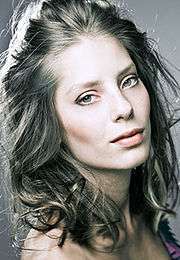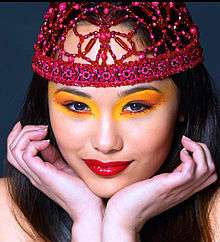Head shot
A head shot or headshot is a specific type of portrait (usually a photograph) that realistically demonstrates a person's appearance for branding or casting. Many head shots are promotional pictures of actors, models, authors. Headshots could be a portrait of a face or full body with a background that clearly illustrate the personality inside the person photographed.
Identification
Head shot photographs are most commonly used in "about us" pages and many people represent themselves using head shots in social media. Other usage include online dating profile pictures. Actors often have a printed head shot with an attached résumé for auditions or an online presence in a casting workbook. Head shots are typically medium close-up (MCU)photographs which show the top of the shoulders up to above the head. In a typical head shot the eyes will be in the top, middle half of the photo according to the rule of third.
Entertainment industry

In theater, film, and television, actors, models, singers, and other entertainers are often required to include a head shot, along with their résumé, when applying for a job. These head shots are usually more artistic: they intend to portray the subject in the best possible light.[1] Head shots often feature the actor or actress facing off-center. A performer will often have head shots expressing different poses and expressions to give a potential employer an idea of the subject's range of appearances or expressions. These types of head shots are called "looks". It is common for an actor to have different head shots for different roles, but for the most part these consist of a change in attire. The head shots that include a person’s shoulders are called "three-quarter" shots. Previously, head shots were often in black-and-white; however, most head shots are now taken in color.[2]
Actors' head shots, when printed and not simply uploaded online to an industry database, are done in an 8"×10" format. Other promotional images, for example, press shots and lobby prints, may be in many different aspect ratios. Acting head shots are often not photographic prints, instead they are typically printed via a lithographic or laser process.
The main purpose of an actor's head shot is identification. Therefore, the most important feature of an actor's head shot is that it represents the subject. Theatrical head shots are usually very "neutral" looking shots of the actor clearly showing their facial features.
Head shots are intended to show a person as they currently appear and reflect their best qualities. Therefore, if an actor's hair has been recently cut or colored, they would often get a new head shot to reflect their new image. Additionally, if an actor has a scar or facial blemish, it is expected to be visible on the head shot and not digitally removed from the image. Pimples or spots are temporary and, therefore, are usually digitally retouched.
Modeling industry

Modeling head shots or comp cards, sometimes also called tear sheets, are a compilation of images for casting in one sheet with a résumé of work, name and relevant statistics. They are often done in color; however in some jurisdictions, such as the UK, they may be in black-and-white. Models often use them for castings and modeling work applications. A close-up head shot is often required to show a model's skin complexion for beauty work.
Modeling head shots are usually used for:
- Comp cards or tear sheets
- Modeling portfolios
- TV advertisements for skin products
- Magazine advertisements for creams and other skin or hair products
- Online industry profiles
Models' head shots are also often professionally retouched to ensure their close-up beauty photograph appears perfect without blemishes or spots.
Comp cards are one of the cornerstones of a model’s “marketing materials”. They are about 5½×8” and printed on both sides. Almost all comp cards are in color but may include black-and-white images. A model may have four to five images on the comp card and at least one of these images will be a head shot.
Corporate and business head shots

Corporate head shots are portraits often produced digitally and used for engaging in social media, the 'about us' page and industry specialty sites. A headshot or head shot is often used for branding and to showcase the business leader's life, style and personality while corporations will use the headshot to merge branding between the people working for them and its agency. Traditional head shots are still taken in a studio setting, though shots "on-location" or "in-the-field" continue to increase in popularity. In both cases, backgrounds tend to be simple. Subjects are often shown head-to-chest or head-to-torso.
Corporate head shots serve a variety of purposes:[3]
- Annual reports
- LinkedIn personal profiles as well as publisher profiles
- About us page
- (Nonstandard) résumés
- Corporate catalogs, brochures and advertising collateral
- Company publications and websites, internal and external
- Press releases and other announcements
- Marketing materials
- Articles and newspapers
- Author pages
Branding Headshots

Branding Headshots may be a corporate or business headshot with the difference being that the image is designed to convey the individual's or a corporate branding identity. A corporation may chose a streamlined background for all its headshots while an individual may chose an action, experience or background objects to identify his or her brand. Large Corporations, firms and/or agencies will usually have a manual for the type and style of headshot to be photographed.
See also
- Close-up, for use in film-making
- Photography
- Portrait
- Mug shot
References
- ↑ Kolonia, Peter (9 April 2015). "Tips From a Pro: Peter Hurley on High-End Headshot Photography". Popular Photography. Retrieved 17 April 2015.
- ↑ Sanville, Michael (25 February 2011). "Taking Your Best Shot". Backstage. Retrieved 17 April 2015.
- ↑ Locke, David. "What Is A Corporate Headshot". 06 November 2009. Retrieved 21 April 2015.
| Wikimedia Commons has media related to Head shots. |